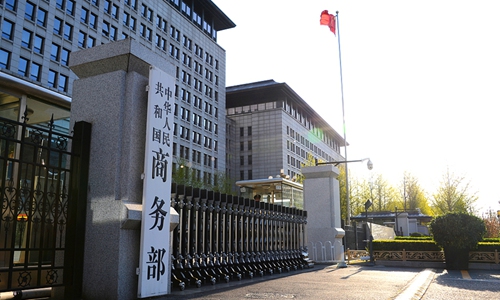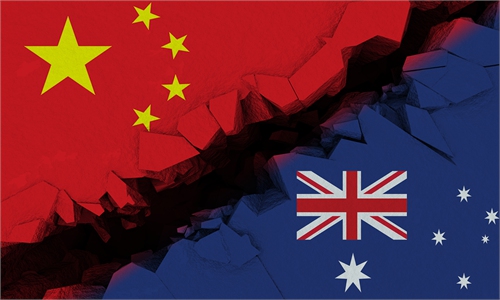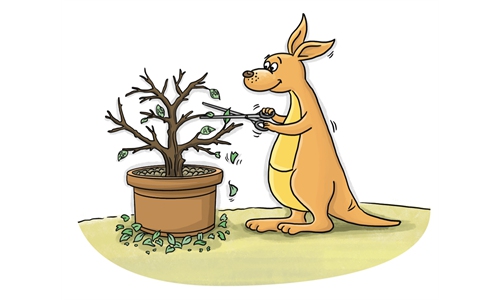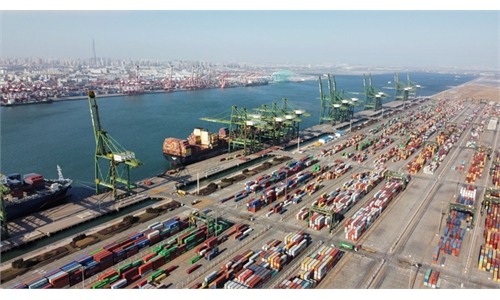
The Ministry of Commerce (MOFCOM) Photo: VCG
China on Thursday took disputes with Australia over railway wheel hubs, wind towers and stainless steel sinks to the WTO, days after Australia took a wine dispute to the world trade body, as bilateral trade tensions escalate.
The move is seen as "reciprocal treatment" by the Chinese side after Australia took two trade disputes, over barley and wine, to the WTO in the past six months, analysts said.
If Australia refuses to end discriminatory trade policies against Chinese companies, China could take more complaints to the WTO, given the abundance of Australia's abuse of trade remedy measures, they warned.
China has filed three complaints with the WTO over Australian anti-dumping and countervailing tariffs levied on railway wheel hubs, wind towers and stainless steel sinks imported from China, the Ministry of Commerce (MOFCOM) said in a statement on Thursday.
At a press conference on the same day, MOFCOM spokesperson Gao Feng told reporters that China is opposed to the abuse of trade remedy measures and will defend the interests of Chinese companies as well as the authority and effectiveness of the multilateral trade mechanism and the WTO.
The methods through which Australia drew its conclusions are flawed, Gao said, noting that such methods violate the WTO's Anti-dumping Agreement and Agreement on Subsidies and Countervailing Measures.
It is hoped that the Australian side could take concrete steps to rectify its wrongdoings, avoid confrontational measures, and bring the two nations' trade ties back to normal as soon as possible, Gao said.
The WTO faces unprecedented challenges, Gao said, and China is opposed to the abuse of trade remedy measures, and it believes that such measures are detrimental to the seriousness and authority of WTO rules.
Moves by the two countries to send more complaints to the WTO indicate a further escalation of bilateral trade tensions, Chen Hong, director of the Australian Studies Center at East China Normal University (Shanghai), told the Global Times, adding that China will not hesitate to take more complaints with Australia to the WTO, if the former refuses to end discriminatory trade policies against China.
"Australia has launched 106 anti-dumping investigations against Chinese imports, while China has launched only four against imports from Australia," Chen said.
Chen said that China and Australia should have a mutually beneficial economic relationship, but trade disputes are being politicized by Australia, adding the previously warm trade relationship was sabotaged by Australia's prejudicial and discriminatory policies against China.
"If the rivalry continues to escalate, China will no doubt take the rest of the 106 anti-dumping investigations to the WTO," Chen said.
Australia imposed anti-dumping duties on imported Chinese railway wheels in 2019. In 2017, China's exports of the item to Australia were worth $7.7 million.
Australia in February 2020 decided to maintain anti-dumping duties on Chinese deep-drawn stainless steel sinks. The wind tower dispute dates back to 2013.
Since the signing of a free trade agreement between the two countries, China has only launched a dozen anti-dumping or countervailing investigations against Australian products, in contrast to nearly 100 probes launched by the Australian side against Chinese goods.
Yu Lei, chief research fellow at the research center for Pacific island countries of Liaocheng University in Shandong Province, told the Global Times on Thursday that the difference in the number of probes laid bare the fact that Australia has engaged in discrimination and unjust practices over its trade with China.
"It is about time to thoroughly settle the issue of injustice in China-Australia trade, and the Australian side's politicizing of trade matters and making trade an ideological matter," Yu said.
"Tackling these historic problems and raising attention to these matters on the Australian side and around the world are necessary steps to futher promote the sound development of China-Australia trade, as well as trade liberalization and trade fairness in the Asia-Pacific region," noted Yu.
Since Thursday's complaints only cover a tiny fraction of Australia's trade remedy measures against Chinese products, the move cannot be described as China hitting back, Yu said.
Since 2018, Australia has repeatedly used discriminatory measures against Chinese companies, politicized trade and investment, and heightened cross-border investment reviews based on so-called national security concerns. This has caused Chinese investment into Australia to plummet, according to media reports.
Due to the iron ore trade and high commodity prices, trade between Australia and China avoided a plunge, recording a 23-percent year-on-year rise from January to May to $87.88 billion, Chinese customs data showed.





